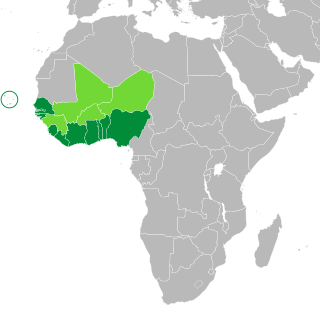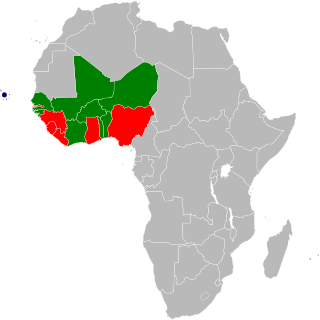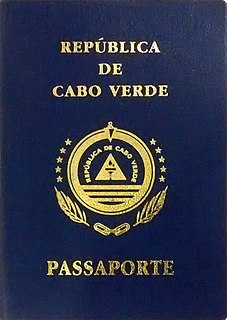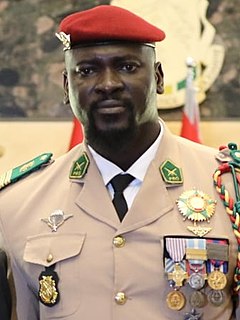| |||||
| Decades: | |||||
|---|---|---|---|---|---|
| See also: | |||||
Events in the year 2001 in Burkina Faso .
| |||||
| Decades: | |||||
|---|---|---|---|---|---|
| See also: | |||||
Events in the year 2001 in Burkina Faso .

Senegal's first President, Léopold Senghor, advocated close relations with France and negotiation and compromise as the best means of resolving international differences after Senegal's independence from its status as a French colony. To a large extent, the two succeeding presidents, Abdou Diouf and Abdoulaye Wade, have carried on Senghor's policies and philosophies. Senegal has long supported functional integration among French-speaking West African states through the West African Economic and Monetary Union.

The Economic Community of West African States is a regional political and economic union of fifteen countries located in West Africa. Collectively, these countries comprise an area of 5,114,162 km2 (1,974,589 sq mi), and in 2015 had an estimated population of over 349 million.

The First Liberian Civil War was a civil war in Liberia from 1989 to 1997.

The Economic Community of West African States Monitoring Group (ECOMOG) was a West African multilateral armed force established by the Economic Community of West African States (ECOWAS). ECOMOG was a formal arrangement for separate armies to work together. It was largely supported by personnel and resources of the Nigerian Armed Forces, with sub-battalion strength units contributed by other ECOWAS members — Ghana, Guinea, Sierra Leone, The Gambia, Liberia, Mali, Burkina Faso, Niger, and others.

The eco is the name for the proposed common currency of the Economic Community of West African States (ECOWAS). Plans originally called for the West African Monetary Zone (WAMZ) states to introduce the currency first, which would eventually be merged with the CFA franc which is used by the French-speaking west African region within the West African Economic and Monetary Union (UEMOA). This will also enable the UEMOA states to gain complete fiscal and monetary independence from France. The UEMOA states have alternatively proposed to reform the CFA franc into the eco first, which could then be extended to all ECOWAS states.

Cape Verde is an island nation, part of the Macaronesian group of islands of the Atlantic Ocean and was a Portuguese colony during the colonial era between 1460 and 1975. EU-Cape Verde relations are founded on the EU/Cape Verde Special Partnership, agreed in 2007, building on six pillars:

The Cape Verdean passport is issued to citizens of Cape Verde for international travel. Cape Verdean citizens can travel to member states of the Economic Community of West African States (ECOWAS) visa-free.
The Defence Intelligence Agency (DIA), is the primary military intelligence agency of Nigeria. The DIA was established in 1986 to provide an efficient system of obtaining military intelligence for the Nigerian Armed Forces and Ministry of Defence. The DIA promotes Nigeria's Defence Policy, enhances military cooperation with other countries, protects the lives of Nigerian citizens, and maintains the territorial integrity of Nigeria. The DIA is headed by the Chief of Defence Intelligence (CDI) who is appointed by the President of Nigeria.

Presidential elections were held in the Gambia on 24 November 2011. Incumbent President Yahya Jammeh, in office since seizing power in a 1994 coup, faced Ousainou Darboe of the United Democratic Party and Hamat Bah of the National Alliance for Democracy and Development.

The 2012 Malian coup d'état began on 21 March that year, when mutinying Malian soldiers, displeased with the management of the Tuareg rebellion, attacked several locations in the capital Bamako, including the presidential palace, state television, and military barracks. The soldiers, who said they had formed the National Committee for the Restoration of Democracy and State, declared the following day that they had overthrown the government of Amadou Toumani Touré, forcing him into hiding. The coup was followed by "unanimous" international condemnation, harsh sanctions by Mali's neighbors, and the swift loss of northern Mali to Tuareg forces, leading Reuters to describe the coup as "a spectacular own-goal". On 6 April, the junta agreed with Economic Community of West African States (ECOWAS) negotiators that they would step down from power in return for the end of sanctions, giving power to a transitional government led by parliament speaker Dioncounda Traoré. In the following days, both Touré and coup leader Amadou Sanogo formally resigned; however, as of 16 May, the junta was still "widely thought to have maintained overall control". On 3 December 2013, a mass grave was discovered in Diago holding the remains of 21 soldiers that went missing the year before, loyal to the ousted president.

The Gambian constitutional crisis occurred following presidential elections in December 2016, in which challenger Adama Barrow achieved an upset victory over longtime incumbent Yahya Jammeh. It eventually concluded after a military intervention by the Economic Community of West African States (ECOWAS) led to Jammeh’s departure from the country.

The ECOWAS military intervention in the Gambia or the ECOWAS Mission in The Gambia – code-named Operation Restore Democracy – is an ongoing military intervention in The Gambia by several member states of the Economic Community of West African States.
Marcel Alain de Souza was a Beninese politician and banker. He served as President of the ECOWAS Commission from April 2016 until February 2018. He was Minister for Development, Economic Analysis and Forecast of Benin from May 2011 until June 2015.

General elections are scheduled to be held in Mali by February 2024. Previously they were scheduled to be held on 27 February 2022. The first round of presidential elections is to be held on the same date as the legislative elections.

Mamady Doumbouya is a Guinean military officer serving as the interim president of Guinea since 1 October 2021. Doumbouya led a coup d'état on 5 September 2021 that overthrew the previous president, Alpha Condé. He is a member of the Guinean Special Forces Group and a former French legionnaire. On the day of the coup, Doumbouya issued a broadcast on state television declaring that his faction had dissolved the government and constitution. On 1 October 2021, Doumbouya was sworn in as interim president.
ECOWAS Bank for Investment and Development, also known as EBID, is the financial arm of the Economic Community of West African States. It was established on May 28, 1975 to fund development projects and programmes to support socio-economic development within member states.

Parliamentary elections were held in The Gambia on 9 April 2022 to the 58-member National Assembly.

A coup d'état was launched in Burkina Faso on 23 January 2022. Gunfire erupted in front of the presidential residence in the Burkinabé capital Ouagadougou and several military barracks around the city. Soldiers were reported to have seized control of the military base in the capital. However, the government denied there was an ongoing coup in the country. Several hours later, President Roch Marc Christian Kaboré was reported to have been detained by the soldiers at the military camp in the capital. On 24 January, the military announced on television that Kaboré had been deposed from his position as president. After the announcement, the military declared that the parliament, government and constitution had been dissolved. The coup d'état was led by military officer Paul-Henri Sandaogo Damiba.

A coup d'état was attempted in Guinea-Bissau on 1 February 2022. A few hours later, president Umaro Sissoco Embaló declared the coup over, he said that "many" members of the security forces had been killed in a "failed attack against democracy."
Events in the year 2016 in Liberia.